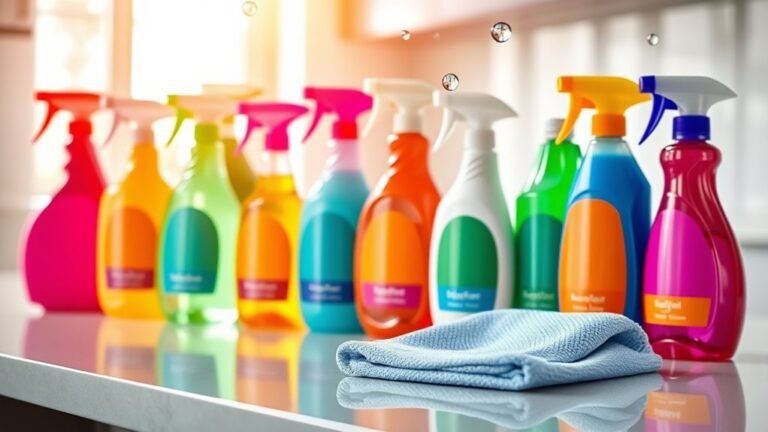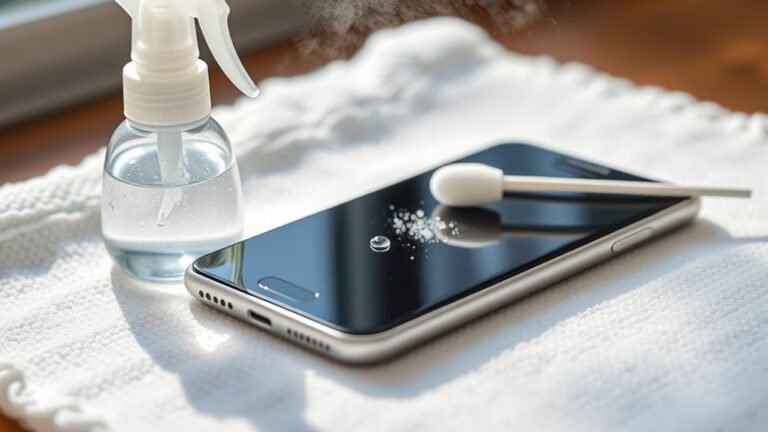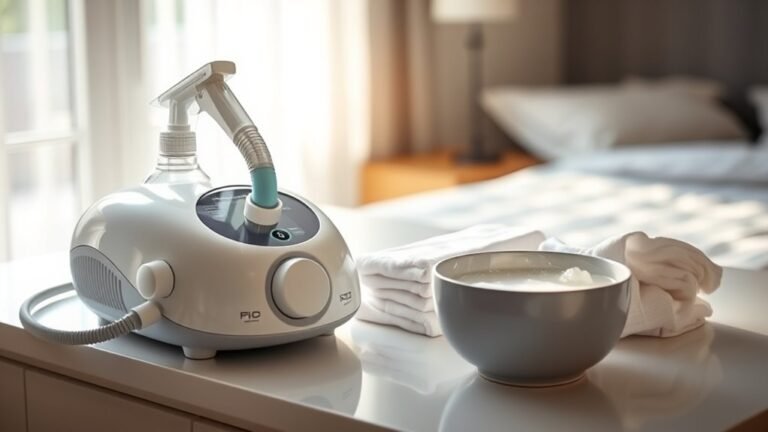Best Products to Clean Your Keyboard
To keep your keyboard clean, use microfiber cloths to gently wipe away oils and dust without scratching surfaces. Compressed air sprays help blast out debris from hard-to-reach spots without damage. Keyboard cleaning gels mold into crevices to lift crumbs effectively, while soft bristle brushes sweep away dust safely. For disinfecting, choose electronic-safe solutions with at least 70% isopropyl alcohol. If you want to maintain a hygienic and functional setup consistently, there are additional tips worth exploring.
Microfiber Cloths and Cleaning Wipes

When it comes to keeping your keyboard spotless, microfiber cloths and cleaning wipes are some of the most effective tools you’ll want to have on hand. Microfiber benefits include their ability to trap dust and oils without scratching delicate surfaces, making them ideal for frequent use. When using microfiber cloths, apply gentle pressure and clean in a circular motion to lift dirt without pushing it deeper between keys. Cleaning wipes offer convenience for quick touch-ups, especially those designed with electronics-safe solutions that won’t leave residue. You’ll want to avoid overly wet wipes to prevent moisture damage. By mastering these cleaning techniques, you maintain your keyboard’s performance and appearance, giving you the freedom to work or play without distractions from grime or sticky keys.
Compressed Air Sprays
While microfiber cloths and cleaning wipes handle surface dirt effectively, they can’t reach the debris lodged beneath your keyboard keys. That’s where compressed air sprays shine. They blow out dust and crumbs without needing to dismantle your keyboard, making cleanup quick and hassle-free. To get the most from compressed air benefits, hold the can upright and use short bursts to avoid moisture buildup.
| Advantage | Tip for Proper Usage |
|---|---|
| Removes hidden debris | Hold can upright |
| Non-contact cleaning | Use short bursts |
| Easy to use anywhere | Keep a safe distance (6-8″) |
Keyboard Cleaning Gels and Putty

Although compressed air sprays are great for blasting out debris, keyboard cleaning gels and putty offer a different approach by molding into crevices to pick up dust, dirt, and crumbs stuck between and beneath keys. When you press the gel onto your keyboard, it conforms to every nook, lifting particles that sprays might miss. This makes it a handy tool in your keyboard maintenance tips arsenal, especially if you want a quick, effective clean without dismantling your keyboard. For best results, follow cleaning frequency recommendations by using gels once every one to two weeks, depending on your usage and environment. Just remember to avoid overusing them, as some gels may leave residue. Overall, they’re a simple, flexible option to keep your keyboard fresh and fully functional.
Soft Bristle Brushes
Soft bristle brushes are an essential tool for gently removing dust and debris from your keyboard without causing damage. When you use one, you benefit from its delicate bristles that reach between keys and clean hard-to-access areas effectively. This makes them a key component in your keyboard maintenance tips, ensuring longevity and reliable performance. Unlike abrasive options, soft bristle brushes avoid scratching or dislodging keys, giving you peace of mind during cleaning. You’ll appreciate how easy they make daily upkeep, helping you keep your workspace tidy and free from buildup. Whether you’re at home or on the go, incorporating a soft bristle brush into your routine offers a simple, efficient way to care for your keyboard while maintaining freedom from messy, time-consuming cleaning methods.
Electronic Safe Cleaning Solutions

If you want to clean your keyboard without risking damage, electronic safe cleaning solutions are your best bet. These products are specially formulated to eliminate germs and dirt without harming sensitive components. Electronic disinfectants come in sprays, wipes, or gels designed for devices like keyboards, ensuring effective cleaning while preserving functionality. Unlike harsh chemicals, safe solutions won’t cause corrosion or leave residue that can interfere with your keyboard’s performance. When choosing, look for alcohol-based options with at least 70% isopropyl alcohol, as they quickly disinfect and evaporate without soaking the device. Using these electronic safe cleaning solutions means you can maintain a hygienic setup without sacrificing your keyboard’s longevity or risking costly repairs. It’s the smart choice for freedom from worry and grime.
Frequently Asked Questions
Can I Use Household Cleaners on My Keyboard?
You might want to avoid using regular household cleaners on your keyboard, as they can damage the keys or electronics. Instead, consider household cleaner alternatives like isopropyl alcohol or specialized keyboard wipes. Keyboard cleaning tips include turning off your device and using gentle motions to prevent harm. By choosing the right products and methods, you’ll keep your keyboard clean without risking damage, giving you the freedom to maintain your gear safely.
How Often Should I Clean My Keyboard?
For flawless functionality, frequent keyboard maintenance is fundamental. You should clean your keyboard at least once a week if you use it daily, ensuring grime and germs don’t gather. However, if you eat at your desk or share your keyboard, increase your cleaning frequency to every few days. Regular attention helps preserve performance and prolongs your keyboard’s lifespan, giving you the freedom to work without worrying about dirt or sticky keys slowing you down.
Is It Safe to Remove Keys for Cleaning?
Yes, key removal can be safe if you approach it carefully during your keyboard maintenance. You’ll want to gently pry off keys using a proper keycap puller to avoid damage. Not all keyboards support easy key removal, so check your model’s instructions first. Removing keys lets you clean underneath thoroughly, giving you more freedom to maintain a spotless keyboard. Just remember to keep track of the keys and reattach them properly afterward.
Can Water Damage My Keyboard?
Think of your keyboard as a delicate garden; too much water can drown the roots. Yes, water can damage your keyboard, causing shorts or corrosion if it seeps inside. Proper keyboard care means practicing moisture control—never letting liquids pool near it. If you must clean, use damp cloths sparingly and avoid spraying directly. This way, you maintain freedom to type without fear of costly damage or malfunction.
What Is the Best Way to Disinfect a Keyboard?
To disinfect your keyboard effectively, you’ll want to use disinfecting wipes designed for electronics or keyboard sanitizers that won’t damage the keys. Start by turning off your device and unplugging it. Gently wipe each key and surface, making sure not to let moisture seep inside. These products kill germs without harsh chemicals, giving you a clean and safe keyboard while keeping your freedom to work or play worry-free.






